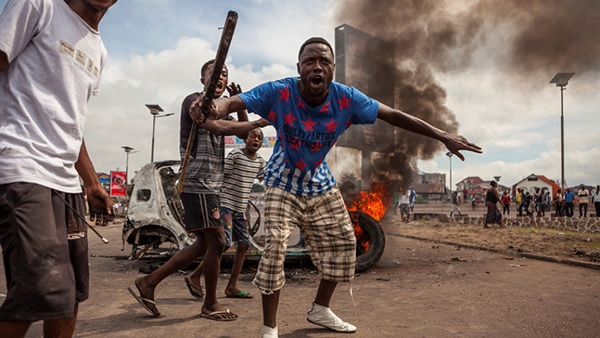
Kinshasa, DR Congo | AFP |
People stayed home across Democratic Republic of Congo on Monday, leaving troops to patrol ghost cities as tension peaked hours before President Joseph Kabila’s mandate ends, but with no election in sight.
Kabila’s second term expires at midday on December 20, but he has shown no sign of stepping down and talks on a peaceful transition are in limbo, sparking fears of fresh violence in the unstable mineral-rich nation.
The normally teeming capital Kinshasa, the megacity of 10 million people, was a shadow of itself on Monday, with barely any traffic on the main roads, public transport at a minimum, and soldiers and police outnumbering passers-by.
Shops were shuttered in the main square and there were tense scenes at Kinshasa University, where dozens of police and troops held back hundreds of angry students, AFP journalists said.
At least one man was arrested by military police after a group of protesters sought to block a road in Goma, eastern DRC.
“This silence is hiding our anger but means that tomorrow will be bad,” said a 20-year-old in Kinshasa who gave his name only as Moise.
“Kabila will be over at midnight. Tomorrow I’ll be partying because it’ll be over.”
In the volatile east, five rebels, a South African peacekeeper and a Congolese police officer were killed when militia fighters attacked several buildings in Butembo, including the prison.
A supplier of minerals crucial for everyday items ranging from smartphones to lightbulbs — tantalum, tungsten, tin and coltan — the mineral trade in the east has long been linked to armed groups and conflict.
Kabila, who has been in power for 15 years, is constitutionally barred from seeking a third term but under a recent constitutional court order he may stay on until a successor is chosen.
The ruling party and some opposition leaders have agreed to schedule an election in April 2018, leaving Kabila in office until the vote. But the main opposition bloc rejects this.
In Kinshasa, security forces cordoned off the university but students reached by telephone said they had been planning “to march peacefully” to parliament to demand Kabila step down.
Security was also tight in the second city, Lubumbashi, in the southeast, with most shops closed and very little traffic on the roads.
Social networks have been cut or filtered since midnight Sunday on government orders and police at the weekend banned gatherings of more than 10 people.
Talks to resume Wednesday
In a last-ditch bid to achieve a peaceful transfer of power, the ruling party and fringe opposition groups held talks last week with the mainstream opposition led by 84-year-old Etienne Tshisekedi.
But after a week of mediation, the two sides broke up Saturday with no progress.
Negotiations are to resume on Wednesday when Catholic bishops acting as mediators return from a long-planned trip to Rome — a day after 45-year-old Kabila’s term ends.
A democratic handover would break ground for Congo’s 70 million people who since independence from Belgium in 1960 have never witnessed a democratic transfer of power following polls.
The president has been in office since his father Laurent Kabila was assassinated in 2001. He was elected in 2006, and again in 2011, in a poll the opposition decried as rigged.
Tshisekedi’s opposition grouping has threatened to bring people onto the streets from Monday if the talks failed.
Leaflets urging people to retake Kinshasa “street by street, district by district until we retake the whole of the DRC”, have begun to circulate in the capital.
But so far the opposition has refrained from encouraging a mass mobilisation, while the international community has pleaded for calm on all sides.
“I don’t see (Kabila) caving in to pressure,” his diplomatic advisor Kikaya Bin Karubi said Monday.
“The Congolese people aren’t pressuring President Kabila,” he added.
Some two decades ago, Congo sunk into the deadliest conflict in modern African history, its two wars in the late 1990s and early 2000s dragging in at least six African armies and leaving more than three million dead.
 The Independent Uganda: You get the Truth we Pay the Price
The Independent Uganda: You get the Truth we Pay the Price



